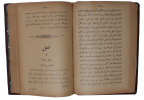"SHAKESPEARE, WILLIAM. [Translated by:] ÖRIKAGASIZADE HASAN SIRRI.
Hamlet. - [FIRST OTTOMAN-TURKISH TRANSLATION OF HAMLET]
Cairo, Kütübhane-i Içtihad, 1908. 8vo. In recent full calf with four raised bands. With blind-stamped ornamentation to boards in old Ottoman style. Very light occassional brownspotting, last few leaves a bit frayed, but no loss of text. Otherwise a fine copy. 243 pp
Reference : 59728
The very rare first complete Ottoman-Turkish translation of Shakespeare’s Hamlet. ""Although Hamlet was performed in Greek in 1842 and in Armenian in 1866 (Silahtaroglu 1989: 7), according to Savas Arslan, ""the first complete translation of Hamlet was made from the French by Abdullah Cevdet and published in Cairo"" (Arslan 2008: 159). Between 1908 and 1910, Abdullah Cevdet produced a large oeuvre of translations, including four translations of Shakespeare's tragedies: Hamlet, Macbeth, Julius Caesar, and Romeo and Juliet to Ottoman Turkish. ""A Certain Abdullah Cevdet, a doctor of medicine, a polemist, a printer, was also known as a Shakespeare idolator as he always found a way of mentioning Shakespeare in all his talks and in all his writings. Abdullah Cevdet translated and published in his own printing house first in Cairo and then in Istanbul five of Shakespeare's play, beginning with Hamlet in 1908 and ending the series with Anthony and Cleopatra in 1921"" (Turhan, Vahit. Shakespeare in Turkish). Although Hamlet was published the same year as The Second Constitutional Era Abdülhamid II seemed to be even less tolerant of the dissemination of Hamlet, Macbeth, and Julius Caesar, all being about unjust rulers who were executed. The performances of these plays were subject to strict censorship in Ottoman dominated countries and they were banned from most of them. (Paker 1986: 91), which is most likely the reason for why Abdullah Cevdet was able to publish the translations of these plays only after 1908, though he had finished translating Hamlet in 1902. ""It is necessary to note here that the initial literary import of Hamlet into the Ottoman literary system has been framed within the broader narrative of Hamidian absolutism. For instance, Ýnci Enginün points out that various attempts to perform Hamlet were turned down by Abdülhamid II in his bid to root out any attempt which would debilitate the absolute monarchy. Along similar lines, Sevda Ayluçtarhan highlights that Abdullah Cevdet’s 1908 translation of Hamlet was a ""critical text"" produced by a prominent culture-planner of the time in opposition to Abdülhamid II’s absolutist regime. Ayluçtarhan further points out that Cevdet’s Hamlet was motivated by his perception of the “parallels between Hamlet’s step-father and Abdulhamid II, who had been brought to the throne (1876) on the condition that he would promulgate the Constitution (Kanun-i Esasi) but did not really keep his promise.Cevdet’s translation was introduced to the Turkish audience at a time when the discourse of westernization was prevalent. The translation coincided with the announcement of a Constitutional Revolution that led to the dethronement of Abdülhamit II and ultimately to the promotion of western-inspired reforms. Since Cevdet was one of the ardent supporters of an Ottoman Renaissance through westernization, his translation has been framed as a symbol of the western canon within the Turkish context. For instance, Demirkol regards Cevdet’s translation as an object of culture-planning which was sought to promote westernization. In the same vein, Paker suggests that Cevdet’s Hamlet plays a ""stimulating if not revolutionary role in the intellectual re-awakening of the Ottoman political and cultural milieu""."" (Durmus, Discourses on Hamlet’s Journey in Turkey).
Bookseller's contact details
Herman H. J. Lynge & Son
William Schneider
Silkegade 11
1113 Copenhagen
Denmark
+45 33 155 335
Payment mode
Sale conditions
All items may be returned for a full refund for any reason within 14 days of receipt.
 Write to the booksellers
Write to the booksellers




